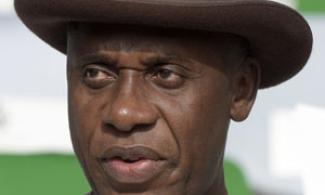
Though it may not be honorable enough to agree with insinuations that successive federal governments deliberately sidelined sea ports in the eastern zone of the country for political and socio-economic reasons, the pathetic state of almost all the ports in NPA’s eastern operation also makes it impossible for anyone to believe otherwise.
How else can anyone describe the pronouncements by some top government functionaries that the crippled activities at eastern ports of Calabar, Warri, Port Harcourt and Onne have consistently made them liabilities on Nigerian Ports Authority (NPA) for almost three decades now, if not to say that they are provocative?
Though it may not be honorable enough to agree with insinuations that successive federal governments deliberately sidelined sea ports in the eastern zone of the country for political and socio-economic reasons, the pathetic state of almost all the ports in NPA’s eastern operation also makes it impossible for anyone to believe otherwise.
Agreed that the ports may have been sustained with the revenue generated from their competitors, the western ports - Lagos Ports Complex, Apapa and Tin Can Island ports - which contribute over 70 percent of the revenue but that was the set out goal by those who held sway at various times to deliberately make eastern ports unattractive and economically unviable.
The ongoing struggle on issues of concession and territorial claims by some powerful maritime operators connected to the Presidency is a clear example of why the eastern ports were deliberately neglected and made to look unviable. If indeed there was a concession agreement that all oil and gas cargoes should be brought to Warri, Onne and Calabar, how do you explain that a bigger chunk of that assignment is currently being diverted to facilities in Lagos?
The sole purpose of this arrangement was to ensure that there was no loss of revenue due to mis-declaration of goods at undesignated terminals such declaring oil and gas pipes as water pipes and paying less import duty. But as usual, under the pretense of security threats, operations and revenues that would have been generated in some of the eastern facilities are taken to ports in Lagos.
Adducing security challenges as the cause for the current abysmal economic performance of the eastern ports is at best diversionary. Security issues are in no way peculiar to that part of the country. It is a problem in the entire Gulf of Guinea which also includes Lagos maritime channels.
It is not out of place to believe that those who reigned in the Ports Authority deliberately cited most of the eastern ports to be non-viable right from onset, particularly the Calabar port. There is nowhere in the whole world where ports of such scales are cited on the convex side of a channel. Those who took the decision or advised the decision makers would have known that the convex side of a channel is prone to sediment deposition which is what is causing the rapid siltation and the ultimate channel draft at the Calabar port. For now, there is no need to bemoan this issue of location as we have moved beyond it. The port has been built and what is now important is how to make it function sustainably.
In as much as the Minister of Transportation Chibuike Amaechi has vowed to restore the economic viability and revenue generating capacities of the eastern ports through massive and aggressive revitalization to make them attractive to importers and thus generated the much needed revenue to the federal government, there are some critical issues that must be addressed first.
There has to be a determined effort championed by the minister to fight the massive corruption in the Nigerian Ports Authority, the agency in charge of directly administering the nation’s ports. Whether anybody wants to hear this or not, NPA is as corrupt as NNPC if not more and the corruption in the agency is both systemic and endemic and as such lip service alone cannot achieve anything if government actually wants to plug the massive leakage in the agency.
The Minister should find out why the huge amount spent on capital dredging at the Calabar Port is not translating in the amount spent on the more frequent maintenance dredging? If you are familiar with the procedure, except its capital dredging, cost of maintenance dredging should not be so high.
Also, why is the maintenance dredging exercise unnecessarily delayed instead of doing it as at when due or even before in order to get the desired results? The minister also has to investigate this because it’s all tied to corruption. How do you explain a situation where there is usually a time lag between the pre-dredging survey and the actual dredging? Most of the survey data used in the maintenance dredging are unreliable as a result of the delay.
Successive NPA managements had sunk billions of naira into the dredging of Calabar port with nothing to show for it. In 2006, the sum of $56million (9billion) was spent to dredge the port while in 2014 another dredging exercise on the port gulped N20billion. The Minister should look back to see what went wrong as relates to the issues of capital and maintenance dredging particularly for the Calabar port.
Addressing the issue of the present non-viability of the eastern ports particularly Calabar is easy if there is political will. Do the first things first and see the facilities rain money into the government coffers after all, who are the importers that are making the Lagos ports viable? Are they not majorly wise men from the east who would prefer using facilities in their areas?
Ifeanyi Izeze writes from Abuja. He can be reached at [email protected].
